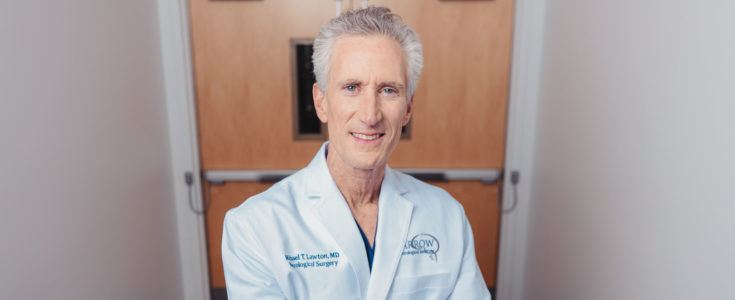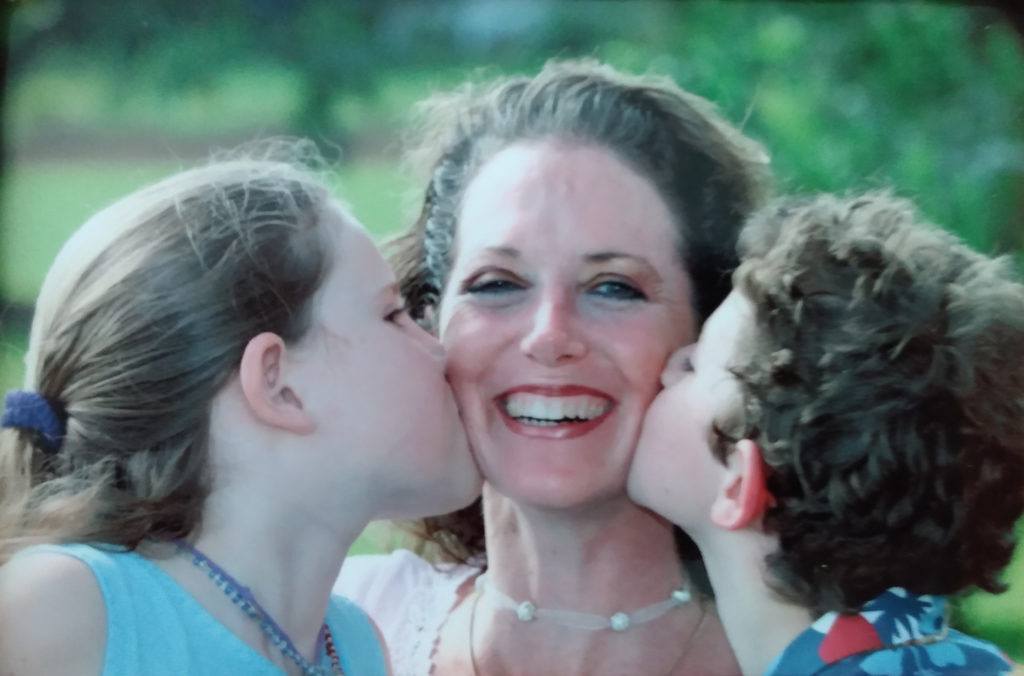
Ivy Blog
It’s Personal: Dr. Michael T. Lawton
- September 17, 2020
- Ivy Center
- Posted in #ItsPersonal

A New Purpose to a Lifetime of Work
“The work that we’re doing here at the Ivy Brain Tumor Center is personal because I had a sister who died of a brain tumor. We didn’t win that war, and we need to do everything we can for all of those who might get this diagnosis in the future.”
– Dr. Michael T. Lawton, CEO of the Barrow Neurological Institute
As part of the Ivy Center’s #ItsPersonal campaign, we are continuing to shed light on the doctors, researchers and nurses that are personally impacted by brain cancer. Every day, these providers continue to dedicate their life’s work to ensuring others won’t succumb to a similar fate as their loved ones. For Barrow Neurological Institute President and CEO, Michael T. Lawton, MD, his work in the neurological field became deeply personal 20 years ago.
The Barrow Neurological Institute performs more brain tumor surgeries than anywhere else in the country making it an ideal location for the Ivy Brain Tumor Center, the largest Phase 0 clinical trials program in neuro-oncology. As the head of Barrow, Dr. Lawton oversees every program and initiative, but he has a personal stake in the clinical trials taking place at the Ivy Center.
Brain Cancer Hits Home
In 2000, Dr. Lawton was performing surgery to repair an aneurysm when a nurse was sent to the OR to notify him that his sister, Lori, had experienced a seizure and was being admitted to the hospital.
After several tests, Lori, a healthy 36-year-old mother of two young children, was diagnosed with a large grade-three tumor on the edge of her thalamus called an oligodendroglioma. Dr. Lawton knew this type of aggressive tumor was not a typical astrocytic tumor. It was very rare and one that behaves similarly to astrocytomas or glioblastomas, mutating and becoming more aggressive as it grows. After Lori’s diagnosis, she had resective surgery, chemotherapy and radiation therapy. Because of its location, the tumor couldn’t be removed completely, so it would have to be managed residually and throughout her next seven years of life.
Dr. Lawton committed to being there for his sister every step of the way, developing a new perspective on brain cancer patients. “It changed my life,” Dr. Lawton explained, “Here I was, dealing with this disease and dealing with these patients all the time, but never really feeling what it was like to be on the other side. Unfortunately, it’s one of those things that we couldn’t beat, but it’s one of those things that I think every care provider probably should go through because you can’t look at a patient the same again – it becomes more personal, you connect with their stories. You realize what it’s like and what you’re asking them to do. Even the simple act of going to sleep the night before the surgery is impossible, even as a brother. These are the kinds of things that pull you into that reality.”
Dr. Lawton brought his sister to the University of San Francisco where he was working at the time. Various neuro-oncologists evaluated her and provided her with a second opinion. He took Lori to her radiation treatments and would visit her regularly from the very beginning to when she was eventually admitted into hospice. “My sister prided herself as a fighter. She was always somebody who wanted to step up, step into the ring, and take the swings and take the hits, whatever they were. She wanted to live for her kids. And it didn’t happen.”

A Shift in Perspective
“I think whenever you go through something like that, with someone so close, you can’t look at your work the same. There’s an urgency that is inescapable and you feel it like a weight on your shoulders. Before Lori’s story, I was in that same boat as all of those researchers, all of my partners who were chasing NIH grant funding and doing great science. And you can easily start to think about that. It’s just an academic pursuit and a way to notoriety in your specialty or to your next podium talk at the big meeting,” Dr. Lawton recalls.
“But then when this happens, it becomes this race against time to save somebody who you love. And it’s no longer good enough just to do good science or to get that paper in Nature or in Science, that stuff is meaningless. It’s all about can you cure this disease? Can you think of an idea that would make the difference? And you only have so much time.”
“Brain cancer is really one of the most terrible, violating sorts of illnesses that you could possibly have,” explained Dr. Lawton. “Our brains are our most prized possessions. They make us who we are. And the thought of a tumor taking over that organ and taking over who you are as a person is a really devastating thing to think about.”

A friend of the Lawton family painted an intimate portrait of Lori on a horse in honor of her love for the animal and her free-spirited way of life. Dr. Lawton keeps the portrait in his home as a way to honor his sister, and often refers to it for inspiration and reassurance of his life’s work. Dr. Lawton continues, while describing his sister’s well-natured being, “If there is anything that I can say to motivate anyone, either a scientist to do research, or a donor to give a few dollars or anything to help join the cause, I think that’s really what it’s about. It’s about helping people like Lori, who just wanted to ride horses and be with her kids to have a few more days to do that.”
“We all look for things to motivate us in our lives, to find meaning or to make a mark and so much of what we do amounts to nothing, but saving a life and saving many lives is a real meaningful impact. When I look at this painting now, I just feel like my purpose on this Earth is not to relax and to enjoy the things that I’ve accomplished, it’s to keep tackling that next battle.”
Progress in the Field of Brain Tumor Research
Working with aneurysms and other vascular disorders, Dr. Lawton feels similarly to the doctors, nurses, and researchers at the Ivy Brain Tumor Center. He describes this work as an unending, uphill battle, but having a group of people going through something similar is what helps drive their mission forward.
“I believe it’s really important for patients with really complex diagnoses, like brain tumors, to come to the very best centers. I see it all the time in my work, but I particularly see it in brain tumors. If you cut corners, if you don’t give patients their very best shot, particularly from the get go, it’s a game of catch up and you can’t give a tumor like this any kind of advantage,” explains Dr. Lawton. “I’m so proud of the Ivy Brain Tumor Center, because I think we are that center. I don’t think there’s a better brain tumor center in this country. We have put together an incredible team.”
“Catherine Ivy has given us incredible resources to make this the very best brain tumor center in the United States and I think people need to know that. People need to know that even though this isn’t out of a university, we have the opportunities as an institute to do things that universities could never accomplish. When patients get their diagnosis, they need to think of Barrow. They need to think Ivy Brain Tumor Center, and their journey should start with us. I think that what Barrow offers and what Barrow represents is the place where the impossible can happen.”
Dr. Lawton explained that the Phase 0 clinical trials program at the Ivy Center brings together a unique set of individuals all striving toward one common goal who aren’t afraid to try everything it takes to help a patient and do so at a critical speed.
“A brain cancer diagnosis is a hard thing to overcome, and that’s why they are dedicated to giving a patient as many options as possible, with a chance to overcome and close the chapter on their diagnosis. I think to me, that’s one of the most rewarding things because you take someone who is really in despair and without hope, you turn their life around and it forges that really special bond. And more importantly, it lets them resume a normal life.”
“The irony of it all still is so incredible to me. Here I am doing what I do. And then for my sister to have this, it’s a one in a million diagnosis. And to have it happen to her and to have it happen when it did and just the whole story feels more than coincidence. I sometimes wonder what the hidden message is there. I have thought a lot about that, but you just can never tell.”
We welcome you to share your story on social media using the hashtag #ItsPersonal and tag the Ivy Brain Tumor Center. We will share as many as we can to support this movement as we continue to build awareness and help those suffering from aggressive brain tumors.
Click here to learn more about why the fight against brain cancer is personal to the team at the Ivy Center.
